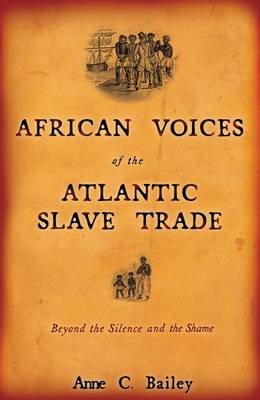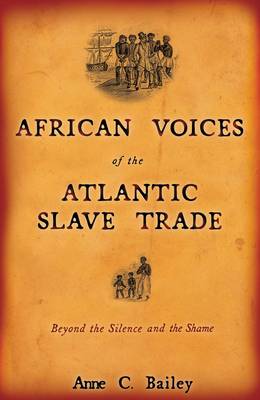
- Retrait gratuit dans votre magasin Club
- 7.000.000 titres dans notre catalogue
- Payer en toute sécurité
- Toujours un magasin près de chez vous
- Retrait gratuit dans votre magasin Club
- 7.000.0000 titres dans notre catalogue
- Payer en toute sécurité
- Toujours un magasin près de chez vous
African Voices of the Atlantic Slave Trade
Beyond the Silence and the Shame
Anne Bailey
Livre broché | Anglais
40,95 €
+ 81 points
Description
"A remarkable effort to present the slave trade from a perspective very different from what we are used to . . . People like Anne Bailey make us uncomfortable, which is all to the good." -Daniel Lazare, The Nation "It's an awful story. It's an awful story. Why do you want to bring this up now?" -Chief Awusa of Atorkor For centuries, the story of the Atlantic slave trade has been filtered through the eyes and records of white Europeans. In this watershed book, historian Anne C. Bailey focuses on memories of the trade from the African perspective. African chiefs and other elders in an area of southeastern Ghana-once famously called "the Old Slave Coast"-share stories that reveal that Africans were traders as well as victims of the trade. Bailey argues that, like victims of trauma, many African societies now experience a fragmented view of their past that partially explains the blanket of silence and shame around the slave trade. Capturing scores of oral histories that were handed down through generations, Bailey finds that, although Africans were not equal partners with Europeans, even their partial involvement in the slave trade had devastating consequences on their history and identity. In this unprecedented and revelatory book, Bailey explores the delicate and fragmented nature of historical memory. "Bailey is not afraid to ask difficult questions . . . [She] expands and troubles our understanding of the African diaspora. In this fine and accessible study of the slave trade, Bailey places African voices of this era at the center of the writing of history." -Robert P. Byrd, Atlanta Journal Constitution "[Bailey's] research is important, her questions provocative, and her arguments sensible." -Kirkus Reviews "Bailey offers a noteworthy, carefully researched contribution to the study of the African slave trade . . . [and] brings unheard historical voices to the fore." -Publishers Weekly "Anne Bailey's judicious, beautifully written account of this extended, appalling human experience is enormously enhanced by her great original contribution-the frequently moving and always thought-provoking memories and understandings of that tragedy amongst the descendants of those who participated as victims and perpetrators in West Africa itself." -Richard Rathbone, professor emeritus, School of Oriental and African Studies, University of London Anne C. Bailey is assistant professor of history at Spelman College. Born in Jamaica, she is the author of two historical novels. Bailey has spent time in and among various communities in Ghana, collecting numerous oral histories. She lives with her son, Mickias Joseph, in Atlanta, Georgia
Spécifications
Parties prenantes
- Auteur(s) :
- Editeur:
Contenu
- Nombre de pages :
- 304
- Langue:
- Anglais
Caractéristiques
- EAN:
- 9780807055137
- Date de parution :
- 01-01-06
- Format:
- Livre broché
- Format numérique:
- Trade paperback (VS)
- Dimensions :
- 155 mm x 222 mm
- Poids :
- 417 g

Les avis
Nous publions uniquement les avis qui respectent les conditions requises. Consultez nos conditions pour les avis.






